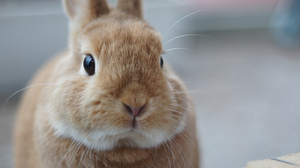Oral health is integral to a pet's health, but rabbits need special consideration

flickr photo by wystyrder
These cute animals do have some interesting characteristics that set them apart from others pets, and one in particular requires special attention: their teeth.
Rabbits are known for their ceaseless chewing, but they use their teeth to do all sorts of other things like groom themselves and other bunnies, express emotions, explore their surroundings, and more.
Seeing how important teeth are to these pets, it's integral to help them maintain oral health and to address problems that arise, like teeth that are compromised, points or spurs on cheek teeth (molars), foreign bodies getting lodged or an abscess and infection in the mouth.
As a quick primer in case you don't know, adult bunnies have 28 teeth —just like most humans — but they’re arranged a bit differently.
The incisors — two on the top and two on the bottom — are the most visible teeth and are the ones that can do the most damage. Designed to grasp food and graze it apart, incisors also grab and cut a lot of other things that shouldn't be within reach — like electrical cords and such.
Peg teeth are right behind the incisors and seldom have problems.
Their back teeth, called molars (or cheek teeth), are harder to see. They grind down the hay and vegetables to an optimal size for digestion. In healthy rabbits, they grind their molars to maintain the proper length. (Cheek teeth can develop spurs; these sharp, spiny growths can be painful.)
Aside from spurs, malocclusion is a common issue in bunnies — especially dwarf breeds — because of the higher incidence of congenital deformities in the mouth. Malocclusion, simply defined is when teeth that don't meet and wear properly, allowing the teeth to overgrow and be in need of frequent trimming. Normally, a bunny's teeth match up perfectly, and are kept ground down by the simple action of chewing.
Malocclusion can make eating and drinking difficult, and can cause other health problems like intrusion of the teeth into the roof of the mouth and into tender skin on the face.
Prolonged problems can lead to serious illness and death.
The good news is, that with regular physical exams by a clinician who has experience with rabbits, and vigilance on the part of their owners, problems can be kept in check making for a healthy, happy companion animal. Click here on how to examine your bunny's teeth.
Aside from regular exams, understanding that changes in a rabbit's behavior or habits can be a sign of trouble with dentition, like:
- Withdrawing from usual activities/interests; grouchiness or aggression
- Drooling; wetness around the mouth
- Swelling, warmth or signs of pain at the jawline or under chin
- Change in food preference; usually going from harder to softer foods
- Showing interest in food, but not eating
- Weight loss
- Bad odor coming from the mouth
These signs mean that your rabbit needs to see a vet that has experience with this species, right away.
Lorrie Shaw leads the pets section for AnnArbor.com. Connect with her on Google + or e-mail her directly.

